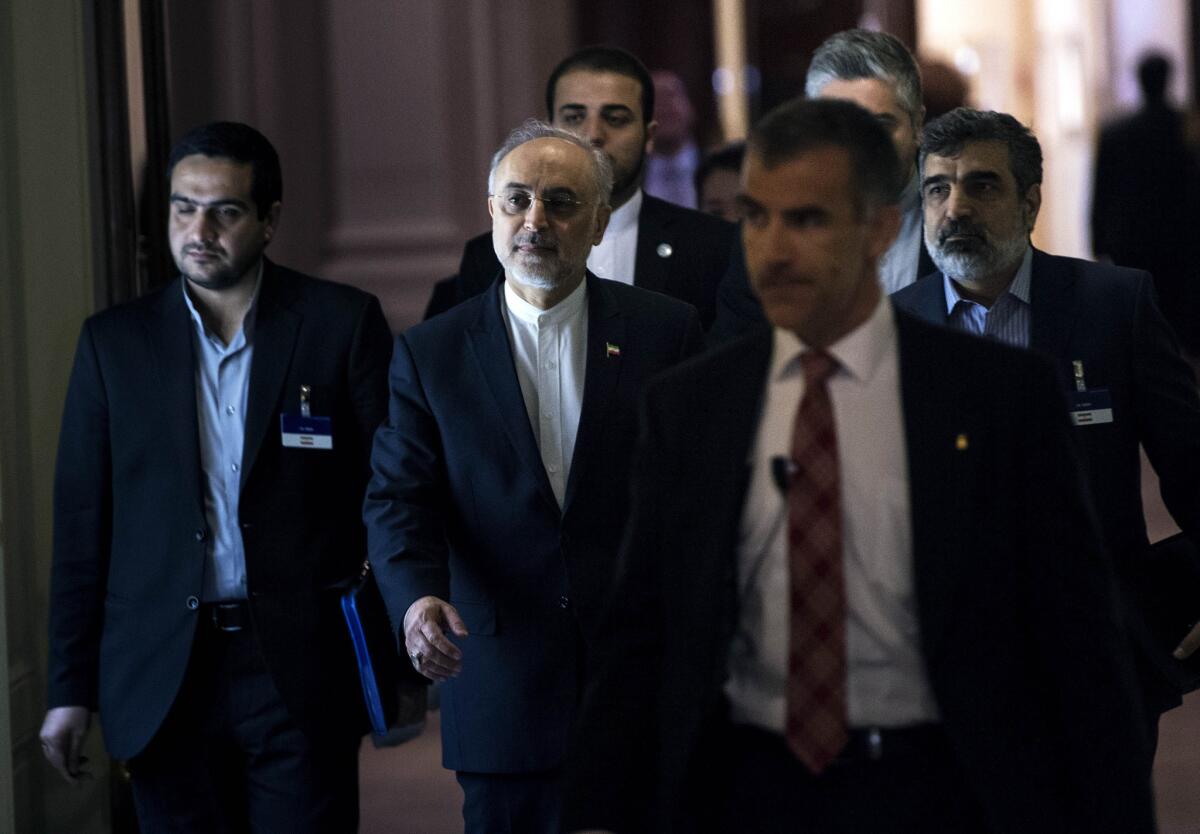Iran nuclear talks miss deadline again, are extended another day

- Share via
Reporting from Lausanne, Switzerland — Negotiators failed to reach an accord over Iran’s disputed nuclear program again Wednesday, a day after they missed a self-imposed deadline, but extended the wearying talks for another day.
With negotiations still underway between Iran and six world powers Wednesday evening, aides said Secretary of State John F. Kerry would remain in Lausanne at least until Thursday morning in hope of achieving a breakthrough.
“We continue to make progress but have not reached a political understanding,” said Marie Harf, the acting State Department spokeswoman, referring to an outline of a deal that would kick the talks into a separate three-month phase.
Diplomats for Iran and a diplomatic bloc made up of the United States and five other world powers insist they could complete the outline at any time. But they have been unable to settle stubborn disputes that have defied resolution in seven straight days of intense talks.
German Foreign Minister Frank-Walter Steinmeier, who has generally been optimistic, told journalists that the group planned to press Iran to offer compromise solutions. He described the negotiations as a “struggle.”
Over the last 18 months, negotiators have sought to craft a deal that would ease economic sanctions on Iran if it accepted restrictions intended to prevent it from someday building a nuclear bomb. If the two sides can agree on an outline, they will try to finish a comprehensive agreement by June 30.
Foreign ministers from France, Germany, Britain, Russia and China joined Kerry in Lausanne over the weekend to build pressure on Iran. But the two sides could not resolve two major issues: how quickly to lift United Nations sanctions on Iran, and how many restrictions will remain in place at the end of the expected 10- to 15-year agreement.
Chinese Foreign Minister Wang Yi, French Foreign Minister Laurent Fabius, and Russian Foreign Minister Sergei Lavrov abruptly left Lausanne early Wednesday after the talks blew past a midnight deadline. Fabius said he could return if needed.
The diplomats missed two deadlines last year, and President Obama told the U.S. team he wanted a definitive decision by March 31 on whether an agreement with Iran was possible. The other major powers had agreed, hoping it would put pressure on Iran’s government to shelve some of its objections.
But Iran has stood firm on key issues, and the latest missed deadline has become a political vulnerability for the Obama administration. Many U.S. lawmakers and allies in Israel and Arab nations have sharply criticized the White House for making what they say are too many concessions to Iran in the talks so far.
One possibility is that the talks will break up in the next day or so with only a general press statement, then resume after a few days to try to work out a detailed agreement that can help the White House convince skeptics in Congress that it is making progress. A halt without a deal would be a setback for the White House, which is concerned that when lawmakers return April 13 from a recess Congress will impose new sanctions that could wreck the talks.
White House officials are hoping the talks produce a detailed outline so they can explain to the public how they intend to solve the problems involved in restraining Iran’s nuclear program.
Iran has resisted the idea of releasing details, however, warning that would only provide a target for critics while bargaining was still underway.
The U.S. side might need to delay some decisions until later in the bargaining, analysts said. But U.S. lawmakers and others are expected to insist that even an outline provides proof that any deal will ensure that Iran cannot build a bomb.
Robert Einhorn, a former member of the administration’s Iran team, predicted Wednesday that the deal the U.S. team will take back to Washington “will fall short of expectations.”
“It will get a lot of disappointment in the American administration, and a lot of skepticism in Congress whether a deal will ever be concluded,” he said in an appearance at Brookings Institution.
More to Read
Sign up for Essential California
The most important California stories and recommendations in your inbox every morning.
You may occasionally receive promotional content from the Los Angeles Times.














